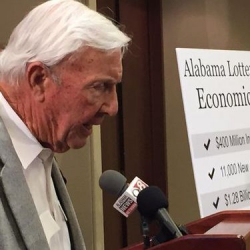Pat Dye, the former head football coach at Auburn University, announced on Thursday he plans to lead a new push to legalize gambling in Alabama. The ex-coach says legalizing a state lottery and expanded casino gaming makes the most sense for the state. Mr. Dye plans on supporting the legislation recently put forward by Del Marsh.
At present, the Alabama state government’s General Fund faces a $200 million annual shortfall. Politicians face the age-old question of whether to raise taxes or cut services, but Coach Dye says a third option exists. To that end, the Alabama Jobs Foundation plans a lobbying and advertising campaign for more legal gambling in the state.
Alabama Jobs Foundation
Dye announced he would serve as the president of the Alabama Jobs Foundation. Foundation spokesman Chip Hill said at a press conference last Thursday that gambling would “have a long-term impact and move us to long-term solvency in the state.”
Hill continued, “Some have talked taxation, some gaming. The political reality is the Alabama Legislature will never raise taxes enough to address our long-term needs.”
Pluses Outweight the Minuses
Pay Dye, who was born in Georgia but is a 35-year resident of Alabama, spoke at the same press conference about the presumed disadvantages of lottery gambling and racino-style casino betting. While acknowledging that social and personal reasons exist to ban gambling, said “the pluses outweighed the minuses”.
The 75-year old member of the College Football Hall of Fame, who coached Auburn from 1981 until 1992, suggested that a pragmatic approach needs to be taken towards Alabama’s budget shortfall.
Referring to the fact many Alabamans travel a short distance to gamble in Mississippi, he said, “I don’t see any alternative right now. It is not like we don’t already have gambling in the state. We just don’t get any revenue from it.”
No Connection to Milton McGregor
Coach Dye said the Alabama Jobs Foundation receives no money from the state’s established gambling industry. He acknowledged that gaming interests might get behind the lobbying effort and make contributions, but he was calling for support from businesses and individual residents from across the state.
When asked about the prospect of Milton McGregor, the owner of Victoryland, would join in his cause, Dye said, “I have no doubt (McGregor) and others would be interested in seeing this passed.”
4 Racetracks Would Be Included
If a racino gaming expansion was passed, Milton McGregor would be able to install slot machine-style gaming machines in his Victoryland racetrack, along with three other establish tracks: the Birmingham Race Course, the Mobile Greyhound Park, and GreeneTrack in Greene County.
A proposed bill which would have given Victoryland that right was defeated in committee last month, after concerted lobbying against expansion by Alabama’s tribal casino interests. Currently, only Native American gaming venues can offer slot machine gaming legally.
Del Marsh’s Gaming Bill
J. Flynn Mozingo submitted paperwork on behalf of the Alabama Jobs Foundation on Wednesday. Mr. Mozingo is a partner at Montgomery’s Melton, Espy and Williams law firm, which has represented Victoryland in the past.
The bill Pay Dye is supporting is quite similar to the one put forward by Alabama Senate President Pro Tem Del Marsh, a Republican from Anniston. Del Marsh’s bill was defeated, though Marsh estimated it would bring in $400 million a year and 11,000 permanent jobs.
Charles McCrary and Raymond Harbert
Charles McCrary, the one-time CEO of Alabama Power, was announced as the vice president of the lobbying group. When asked his motivation, McCrary said he wanted Alabama to increase its profile as a destination state. He pointed to its substantial Gulf Coast beach tourism and suggested that a significant portion of the revenues raised might come from out-of-state sources.
Mr. McCrary added, “It [Alabama] is a destination state for things like the beaches. It may make us a destination state instead of people driving through to buy lottery tickets in the surrounding states, or go to a casino in surrounding states.”
Raymond Harbert, the CEO of Harbert Management Corp., is also committed to joining the lobbying group.

